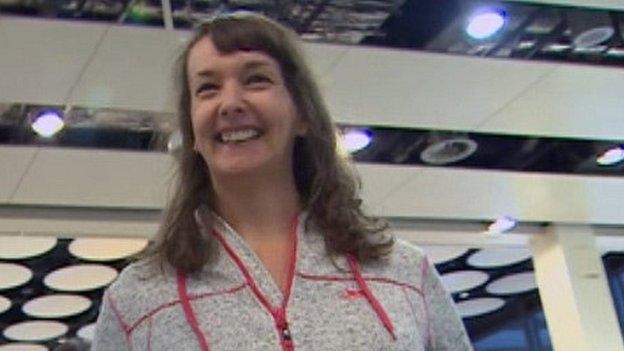Ebola nurse Pauline Cafferkey 'critical for some time'
- Published

Pauline Cafferkey was diagnosed with Ebola in December after volunteering work in Sierra Leone
A British nurse who was diagnosed with Ebola after returning from Sierra Leone could remain in a critical condition for "some time", her family have said.
Pauline Cafferkey's family also thanked the public for their support and hospital staff for their kindness.
The nurse from Glasgow is being treated at London's Royal Free Hospital.
Ms Cafferkey was diagnosed with Ebola in December having volunteered with other UK NHS staff for the charity Save the Children in West Africa.
'Privacy to be respected'
The family statement said: "We would like to thank all our friends, family and the members of the public who have contacted us with support following Pauline's diagnosis with Ebola. We have been very touched by the kind words.
"Pauline continues to be in a critical condition at the Royal Free Hospital. We want to thank all the staff caring for her for their kindness, support and compassion.
"Pauline's condition could remain the same for some time and we would again ask for her and our privacy to be respected."
Ms Cafferkey, 39, is being treated with experimental drugs and has received blood plasma from another British nurse, Will Pooley, who recovered from an Ebola infection last year.
She had travelled home to Scotland via Casablanca, Morocco, and Heathrow Airport in London.
She was initially screened at Heathrow, where her temperature was normal, despite telling officials that she felt unwell.
Her temperature was taken a further six times within 30 minutes, but it was normal each time and she was cleared to fly on to Scotland.
Ms Cafferkey was then placed in an isolation unit at Glasgow's Gartnavel Hospital after becoming feverish, before being transferred by RAF Hercules plane to London on 30 December, and taken to the Royal Free's specialist treatment centre.

Ms Cafferkey had travelled from Freetown in Sierra Leone via Casablanca
Ebola is transmitted by direct contact with the bodily fluids of an infected person, such as blood, vomit or faeces.
The virus has killed more than 7,800 people, almost all in West Africa, since it broke out a year ago.
The World Health Organization says the number of people infected by the disease in Sierra Leone, Liberia and Guinea has now passed 20,000.
- Published5 January 2015
